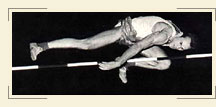|
 Did you know?
Did you know?
- For many of the Olympic winners of the 1964 Olympics their successes did not prove fortunate. After Abebe Bikila and Kokichi Tsuburaya, it  was the great high jumper, the Soviet Valeriy Brumel, who fell victim to a serious accident, which virtually ended his remarkable career. A year after his victory in the high jump in the Tokyo Olympics, Brumel was seriously injured on the leg, when the motorcycle he was riding overturned. After a long hospitalization and efforts to restore his health, the Soviet Olympic winner returned to the track, four years after his accident. That was his last game judging that it was vain to continue to compete. was the great high jumper, the Soviet Valeriy Brumel, who fell victim to a serious accident, which virtually ended his remarkable career. A year after his victory in the high jump in the Tokyo Olympics, Brumel was seriously injured on the leg, when the motorcycle he was riding overturned. After a long hospitalization and efforts to restore his health, the Soviet Olympic winner returned to the track, four years after his accident. That was his last game judging that it was vain to continue to compete.
- The big surprise of the Tokyo Olympics was the 10,000m race won by an unknown, until then, American Sioux Indian marine, Billy Mills. Mills won by achieving an extraordinarily strong finish and beating all the favourites of the race at the last metres. When he returned to his country he was honoured by his tribe by being recognized a "Warrior" and was given the Indian name "The man who loves his country".
- Since the Olympic Games of 1936, the Americans won in every organization the first three places in the 110m hurdles. However, in the Tokyo Olympics this tradition was interrupted by a Soviet runner, Anatoliy Mikhaylov. Not only did the Soviet athlete win the third place, but also was within an ace of finishing second. The judges had to wait for the photo finish, in order to determine the final ranking: Hayes Jones was first, Blaine Lindgren second and Anatoliy Mikhaylov third.
- Weightlifting came to be a Soviet affair in the Tokyo Olympics. Indeed, the Soviet weightlifters monopolized the medals in most of the events, thus proving their rapid progress in that sport. In the heavyweight category, where one of the contenders for the gold medal was Yuri Vlasov, all forecasts were reversed by the victory of another Soviet, Leonid Zhabotinsky, who even set a new world record. Vlasov, disappointed and vexed, threw his silver medal out of the window in the hotel where the Soviet delegation stayed.
|